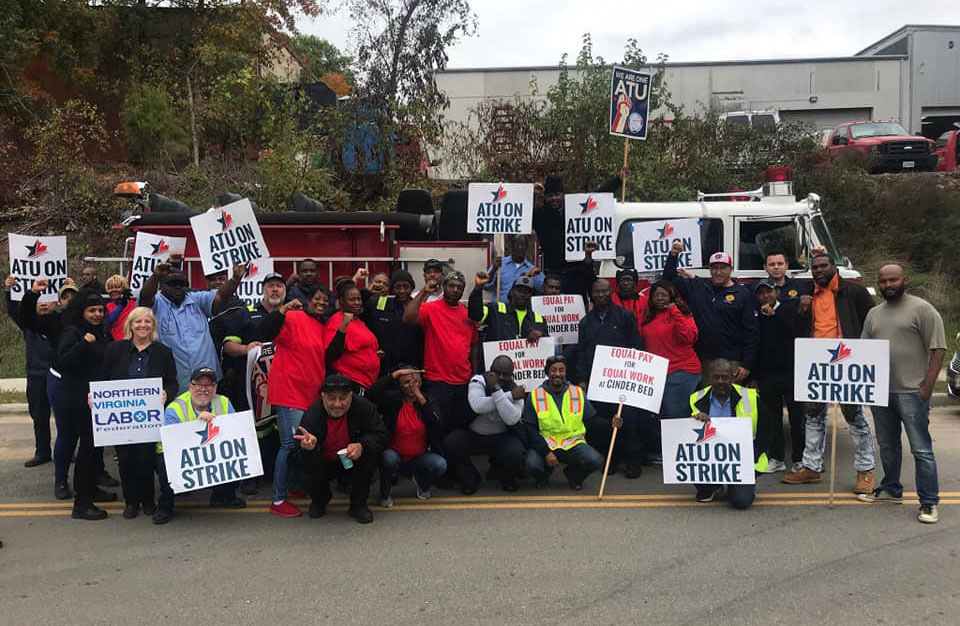
The Washington Metro Area Transit Authority board meeting was supposed to start at 10 A.M. on November 21, nearly a month after workers at the Cinder Bed Road garage began their strike. 10:30 came and went, with no sign of the WMATA executive board. The metro workers and community members who packed the room began chanting “time’s up” until a security guard announced anyone chanting would be told to leave.
Finally, nearly an hour after the meeting’s scheduled start time, the WMATA board members trickled in. They clearly weren’t eager for the public comment section of the day’s meeting, in which they’d have to hear from the workers at Cinder Bed Road garage, who had walked off the job 29 days before thanks to failed contract negotiations.
The striking Cinder Bed workers aren’t negotiating directly with WMATA, but with Transdev — a France-based multinational transit company. Last year, in what it called a “move to control costs,” Metro handed Transdev an $89 million contract to take over services at the Cinder Bed Road garage.
But any cost-saving, as Transdev workers pointed out at the board meeting, comes from cutting worker pay and benefits as well as public safety measures. That’s why the striking workers are taking aim not just at their direct employer, but at WMATA’s push towards privatization — a decision that not only creates a tiered working structure for transit workers but also blurs accountability for public transit.
A bus driver working for Transdev and one employed in-house by Metro might do the same job and drive the same bus. But the Transdev employee makes $12 less an hour, according to Amalgamated Transit Union Local 689, which represents the striking workers. Unlike Metro in-house employees, Transdev workers have a $6000 healthcare deductible. One of their key demands: equal pay for equal work — especially before WMATA expands privatization to other parts of the public transit service.
Throughout the public comment session, workers testified about the impact working for a private contractor has had on their lives. They shared story after story about how the higher healthcare costs, especially combined with lower wages, were taking their toll.
Workers also pointed to the public safety concerns stemming from privatization. One bus driver shared a harrowing experience of losing power to his bus while driving at high speeds in an HOV lane. Workers were sickened earlier this year by chemical leaks on a bus. Privatization, they said, has become a public hazard.
Throughout the meeting, workers and community members demanded accountability from the body that chose to hand Transdev the contract in the first place. They denounced the board for taking public transit out of public hands, and reminded board members that they’d spoken up about their concerns over privatization before they handed Transdev a contract.
“How do you sleep at night?” one worker called out. “On a pillow stuffed with cash,” another responded. Metro general manager Paul Wiedefeld received a nearly 10 percent raise last year, upping his pay to $435,000 a year, despite fare increases and stagnating worker pay. “Shame on you, Paul” was a common refrain throughout the hour.
Once the public comment period ended, organizers from local Jobs With Justice, Sunrise Movement, and Democratic Socialists of America chapters commanded the floor. “This whole thing’s a mess,” one protester yelled as the group held up a banner that read “Equal pay = Equal work” in front of the board seating before Metro security and staff shoved them out of the room. Transdev workers and community members left, joining them for an impromptu march in the neighborhood while the WMATA board meeting continued on.
While the WMATA board may have been free of public condemnation for the rest of the afternoon, they can expect more resistance in the future. It’s been more than a month since Transdev workers began their strike. Workers on the Fairfax Connector, another bus route in Northern Virginia, have also authorized a strike against Transdev, and their contract is due to expire at the end of November. The fight against privatizing the region’s public transit looks like it only has room to grow.
Join us in defending the truth before it’s too late
The future of independent journalism is uncertain, and the consequences of losing it are too grave to ignore. To ensure Truthout remains safe, strong, and free, we need to raise $46,000 in the next 7 days. Every dollar raised goes directly toward the costs of producing news you can trust.
Please give what you can — because by supporting us with a tax-deductible donation, you’re not just preserving a source of news, you’re helping to safeguard what’s left of our democracy.